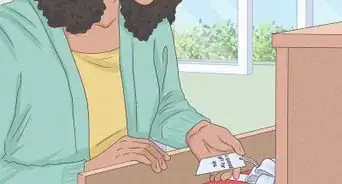This article was co-authored by Kim Chronister, PsyD. Dr. Kim Chronister is a Licensed Clinical Psychologist. She specializes in helping people struggling with substance abuse, relationship problems, eating disorders, and personality disorders. Dr. Chronister has contributed to and appeared on Access Hollywood, Investigation Discovery, and NBC News. She is the author of “Peak Mindset” and “FitMentality.” She holds an MA in Clinical Psychology and a Doctor of Psychology (PsyD) from Alliant International University.
This article has been viewed 159,984 times.
Being a good friend may take some work and patience, but having a great gal pal is worth the effort. Good friends lift you up when you’re sad, make things more fun and exciting, and boost your confidence. Be sure to talk to your friend regularly, hang out when you can, show your support, and act trustworthy. With some effort and care, you can strengthen your current friendships or befriend someone new!
Steps
Communicating and Handling Conflict
-
1Reach out to your friends regularly to check on them and see what's up. Every day or few days, text, instant message, or call your gal pal, based on your schedules. If you only have a few minutes to spare, shoot her a quality text to show her you care. If you have lots of time to kill, give her a call or hop on a video chat. The important thing is that you chat and catch up! This way, you can get to know each other better and become closer friends.[1]
- Ask her how her day’s going, what’s new, and what’s going on with her crush, for instance. Send her a funny picture or interesting article you think she will like.
- If you are very busy and can't chat every day, that’s okay. Simply talk to your friend as often as you can.
- Reach out to your friend whether she lives in your town, a few hours away, or across the country. Distance doesn’t matter when it comes to being a good friend!
-
2Make plans to spend quality time together. If your friend lives nearby, try to hang out several times a week or a few times a month. If your friend lives far away, maybe you can only see them a few times a year. Either way, by hanging out face-to-face, you get to enjoy spending time together. Hang out at home, grab a coffee, go shopping, or see a live concert, for instance.[2]
- You can also invite your friend to go with you to your friend’s birthday party or the high school football game.
- If your friend lives nearby, grab dinner, have a slumber party, or head to the mall.
- If your friend lives further away, make it a point to see each other at least once a year if you can. Try to get together around the holidays or on a birthday, for example.
Advertisement -
3Give advice only when your friend asks for your opinion. Your friendship may seem unbalanced if you are the one who always tells your friend how to fix or improve her life. Rather than jumping into a solution, wait for her to ask you your thoughts instead. This keeps the dialogue balanced, so you can both support each other when needed.
- For example, if your friend says, “I have a date lined up with Jeremy on Friday but I’m really nervous. What should I do?” say something like, “Just be yourself! You know he likes you.”
-
4Understand that your friend has a life outside of your friendship. Try not to take it personally if your friend is busy or if your friend hangs out with other people. While you may be very close, she may have other things in her life taking up her time, such as school, work, hobbies, sports, and after-school activities.[3]
- If you don't give your friend enough space to herself, she may think you are very clingy.
- For example, if your friend has a big test coming up and is too busy to go to a party with you, that's okay. It doesn't mean she doesn't like you.
- In addition, try not to get jealous if your friend hangs out with other people.
-
5Avoid being negative, harsh, or critical to your friend. If you have a generally negative attitude and constantly put your friend down, she won't want to spend time with you. Instead, keep a positive, encouraging attitude as best as you can. Act light-hearted, positive, and fun with her.[4]
- For example, say something like, “Wow I can’t wait for this week to be over,” rather than “This week sucked!”
- If you are negative, harsh, or critical, your friend may take it the wrong way and feel unsupported and isolated rather than encouraged and cared for.
-
6Forgive your friend if she makes a mistake. Everyone makes mistakes, so try not to hold grudges or resentment if your friend does something to upset or offend you. Talk about the situation when it happens, accept your friend’s apology, and let the situation go. If you don't forgive your friend, you may feel negative toward them down the line, and this may affect your friendship in subtle ways.[5]
- For example, if your friend bailed on your plans and hurt your feelings, say something like, “I am hurt that you didn’t show up to our movie night last week.”
- If you are really upset about something your friend did, it's okay if it seems hard to forgive them. Talking about the situation will make you feel better, and you can find out why your friend did what she did.
-
7Apologize to your friend if and when you are in the wrong. Acknowledge when you hurt your friend or acted inappropriately. When this happens, simply apologize rather than being defensive or directing the blame elsewhere. If your friend calls you out or tells you how she feels, put yourself in her shoes and say “sorry.” This keeps your conversations honest and prevents any hard feelings from forming.[6]
- For example, if your friend is upset that you canceled your plans without notice, apologize genuinely and explain that it is nothing personal.
- If you can’t admit when you are wrong, your friend may not trust you or think you are genuine.
-
8Compromise with your friend to make both of you happy. Keep in mind that a good friendship is a two-way street, and you should both be working together to come up with solutions when needed, such as making weekend plans or resolving an argument. This way, you can both have fun together without any regrets![7]
- For instance, when you are making plans, ask your friend what she wants to do or if there is anything she doesn't want to do. Perhaps she wants to stay home and watch movies rather than going out.
Supporting Your Friend
-
1Listen to what your friend has to say when you are together. Pay close attention when your friend talks to you, and keep your focus on her rather than letting your thoughts wander. Try to remember what’s going on in her life and bring it up in conversation to show you care. Being a good friend does not mean you only talk about yourself or want to interject when your friend is talking.[8]
- If you seem distracted or if you are constantly looking at your phone, your friend may not think you care about them.
- For example, if you are hanging out with your friend after school, put your phone away and talk about your day.
-
2Compliment your friend to boost her confidence. Say something sweet to your friend to spread positivity and make them feel good. Give your friend genuine compliments that come from the heart. Compliment your friend whenever the moment seems right. By making her smile, your friend will enjoy being around you and go to you for support.
- Say something like, “You’re such a good friend,” or “You’re so creative” to make them smile.
-
3Perform small gestures to show your friend you care. When you love and care about someone, show them! Do small acts of kindness, such as bringing your BFF coffee in the morning when you know she's late, giving her a “Thank you” card just because, or inviting her over to dinner. Think of gestures you can do to show your friend you are thinking about her.
- You can also send her a “get well soon” text message if she is under the weather or not feeling great.
-
4Celebrate with your friend when she succeeds. When something great happens to your friend, show your enthusiasm with her, such as if she gets accepted to her dream college, gets a raise at work, or gets asked out by a cutie. Say supportive things like, “Wow that’s amazing!” and give her a hug. Not only will this make your friend feel good, but she’ll also know that you have her back.
- Avoid showing jealousy or envy when good things happen to your friend. This is not friendly behavior, and your friend may notice.
- For example, if your friend gets an “A” on her exam, go out to dinner to celebrate.
Being Loyal and Trustworthy
-
1Show up on time when you make plans, rather than being late often. When hanging out with your friend, try to show up a few minutes early or on time no matter what. If you are running late, let them know via phone call or text message. If you are frequently late or not true to your word, your friend may start to doubt how accountable and responsible you are.[9]
- For instance, if you make dinner plans for 7:00 pm, arrive between 6:45 and 7:00 pm.
-
2Keep your promises to show you are responsible. Reliability ensures your friend that you are there for her and she can count on you no matter what. If you do not keep your word, your friend may lose trust in your over time.[10]
- If you tell your friend that you can drive her home from school, wait for her at your car or walk together through the building.
-
3Tell the truth to your friend all of the time. Over time, even small white lies can impact a friendship. If you lie frequently, your friend may start to doubt whether what you tell them is true, question whether you making things up, and not trust you. Always tell her your true feelings, and don't keep secrets from each other. By always telling the truth, you and your friend can trust each other and have a long-lasting, genuine friendship.
- If you tell your friend you are studying but you are actually out with her crush, she may not want to be your friend if she finds out.
-
4Support your friend through rough patches in life. If your friend is going through a difficult time in life, she needs a friend now more than ever. Show your support by check up on her every day, and ask her to spend time with you. You can also get her flowers, bring her chocolate, or give her a big hug to boost her mood.[11]
- For instance, if your friend and her boyfriend just broke up, buy a pint of ice cream, find some movies on Netflix, and have a slumber party.
Expert Q&A
-
QuestionHow do you keep in touch with your closest friend?
 Kim Chronister, PsyDDr. Kim Chronister is a Licensed Clinical Psychologist. She specializes in helping people struggling with substance abuse, relationship problems, eating disorders, and personality disorders. Dr. Chronister has contributed to and appeared on Access Hollywood, Investigation Discovery, and NBC News. She is the author of “Peak Mindset” and “FitMentality.” She holds an MA in Clinical Psychology and a Doctor of Psychology (PsyD) from Alliant International University.
Kim Chronister, PsyDDr. Kim Chronister is a Licensed Clinical Psychologist. She specializes in helping people struggling with substance abuse, relationship problems, eating disorders, and personality disorders. Dr. Chronister has contributed to and appeared on Access Hollywood, Investigation Discovery, and NBC News. She is the author of “Peak Mindset” and “FitMentality.” She holds an MA in Clinical Psychology and a Doctor of Psychology (PsyD) from Alliant International University.
Clinical Psychologist Understand that not every friend wants to stay connected often, no matter how much they like you as a person. Focus on the quality, and not on the quantity of interactions. Do your best to connect on a deeper and more meaningful level by asking them questions that are related to their goals or family or meaning and purpose when you do reach out to them.
Understand that not every friend wants to stay connected often, no matter how much they like you as a person. Focus on the quality, and not on the quantity of interactions. Do your best to connect on a deeper and more meaningful level by asking them questions that are related to their goals or family or meaning and purpose when you do reach out to them. -
QuestionMy friend doesn't want to be my friend anymore because she thinks I'm disrespectful, what should I do?
 Karley SnyderCommunity AnswerStart off by apologizing to your friend. Mention how you might have been disrespectful and take responsibility for your actions. If you are sincere and honest, your friend may forgive you. If your friend is really hurt or upset, you may not be friends anymore.
Karley SnyderCommunity AnswerStart off by apologizing to your friend. Mention how you might have been disrespectful and take responsibility for your actions. If you are sincere and honest, your friend may forgive you. If your friend is really hurt or upset, you may not be friends anymore. -
QuestionShould I tell my friend that I told someone about her problems with her ex-boyfriend?
 Karley SnyderCommunity AnswerThis is a personal choice. If you want to be open and honest with your friend, you could mention it. However, be aware that this may complicate your friendship and your friend may not trust you anymore. Try not to talk about other people behind their back.
Karley SnyderCommunity AnswerThis is a personal choice. If you want to be open and honest with your friend, you could mention it. However, be aware that this may complicate your friendship and your friend may not trust you anymore. Try not to talk about other people behind their back.
Warnings
- Never say bad things about your friend behind her back. This will make her not trust you, and it could ruin other friendships as well.⧼thumbs_response⧽
References
- ↑ https://www.cosmopolitan.com/sex-love/a56213/how-to-tell-if-you-are-a-good-friend/
- ↑ https://www.cosmopolitan.com/sex-love/a56213/how-to-tell-if-you-are-a-good-friend/
- ↑ https://www.cosmopolitan.com/sex-love/a56213/how-to-tell-if-you-are-a-good-friend/
- ↑ https://www.psychologytoday.com/us/blog/emotional-fitness/201108/10-ways-make-and-be-great-friend
- ↑ https://www.psychologytoday.com/us/blog/emotional-fitness/201108/10-ways-make-and-be-great-friend
- ↑ https://www.psychologytoday.com/us/blog/emotional-fitness/201108/10-ways-make-and-be-great-friend
- ↑ https://www.cosmopolitan.com/sex-love/a56213/how-to-tell-if-you-are-a-good-friend/
- ↑ https://tinybuddha.com/blog/25-ways-to-be-a-true-friend/
- ↑ https://www.psychologytoday.com/us/blog/emotional-fitness/201108/10-ways-make-and-be-great-friend
-Step-1-Version-3.webp)
-Step-2-Version-4.webp)
-Step-3-Version-3.webp)
-Step-4-Version-4.webp)
-Step-5-Version-3.webp)
-Step-6-Version-3.webp)
-Step-7-Version-3.webp)
-Step-8-Version-4.webp)
-Step-9-Version-4.webp)
-Step-10-Version-3.webp)
-Step-11-Version-3.webp)
-Step-12-Version-4.webp)
-Step-13-Version-4.webp)
-Step-14-Version-4.webp)
-Step-15-Version-3.webp)
-Step-16-Version-2.webp)




























































